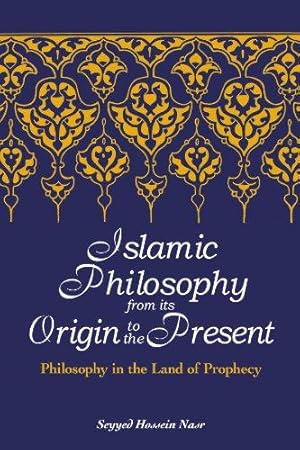
Title

Islamic Philosophy from Its Origin to the Present: Philosophy in the Land of Prophecy (Suny Series in Islam) Seyyed Hossein Nasr
Nasr presents Islamic philosophy in relation to the Islamic tradition as a whole, but always treats this philosophy as philosophy, not simply as intellectual history. In addition to chapters dealing with the general historical development of Islamic philosophy, several chapters are devoted to later and mostly unknown philosophers. The work also pays particular attention to the Persian tradition.
Nasr stresses that the Islamic tradition is a living tradition with significance for the contemporary Islamic world and its relationship with the West. In providing this seminal introduction to a tradition little-understood in the West, Nasr also shows readers that Islamic philosophy has much to offer the contemporary world as a whole.
Product Details
- Authors: Seyyed Hossein Nasr
- Publisher State University of New York Press
- Publish Date: 2006-05-19
- Language: English
- Binding: Paperback
- Print length: 390 pages
- ISBN: 0791468003
- ISBN13: 9780791468005
- Dimensions: Height: 9 inches, Length: 6 inches, Width: 0.88 inches
- Weight: 21 pounds
- Condition: Used Very Good
Subjects: ISLAMIC PHILOSOPHY
About the Author
Seyyed Hossein Nasr (born April 7, 1933, in Tehran, Iran) is one of the world’s leading scholars of Islamic thought, philosophy, and spirituality. A philosopher, theologian, and cultural historian, Nasr is renowned for bridging traditional Islamic wisdom with contemporary intellectual challenges. Educated at MIT and Harvard, where he earned his Ph.D. in the history of science, he became the first Iranian to receive a doctorate from Harvard University.
Nasr’s academic career includes serving as a professor at Tehran University, where he founded the Imperial Iranian Academy of Philosophy, and later at several prestigious American institutions, including George Washington University, where he remains University Professor of Islamic Studies. His scholarly work covers a wide range of disciplines—philosophy of science, metaphysics, Sufism, art, and the dialogue between religion and modernity.
He is the author of more than fifty books and hundreds of essays, including Knowledge and the Sacred, The Heart of Islam: Enduring Values for Humanity, Islamic Life and Thought, and Religion and the Order of Nature. Through these works, Nasr advocates for a return to the sacred worldview that once unified reason, revelation, and nature—a vision he calls “the perennial philosophy.”
Recognized as a key figure in the Traditionalist School, Nasr’s writings emphasize harmony between faith and reason, ecology and spirituality, and the urgent need to recover the transcendent dimension of human existence in a secularized world. His works continue to inspire readers seeking intellectual depth and spiritual clarity in an age of fragmentation.
CrossSelling is by far one of the best ways to boost sales in your ecommerce store. It doesn’t even require a lot of additional work! On average, CrossSelling is considered to be 20 times more effective
Nasr presents Islamic philosophy in relation to the Islamic tradition as a whole, but always treats this philosophy as philosophy, not simply as intellectual history. In addition to chapters dealing with the general historical development of Islamic philosophy, several chapters are devoted to later and mostly unknown philosophers. The work also pays particular attention to the Persian tradition.
Nasr stresses that the Islamic tradition is a living tradition with significance for the contemporary Islamic world and its relationship with the West. In providing this seminal introduction to a tradition little-understood in the West, Nasr also shows readers that Islamic philosophy has much to offer the contemporary world as a whole.
Product Details
- Authors: Seyyed Hossein Nasr
- Publisher State University of New York Press
- Publish Date: 2006-05-19
- Language: English
- Binding: Paperback
- Print length: 390 pages
- ISBN: 0791468003
- ISBN13: 9780791468005
- Dimensions: Height: 9 inches, Length: 6 inches, Width: 0.88 inches
- Weight: 21 pounds
- Condition: Used Very Good
Subjects: ISLAMIC PHILOSOPHY
About the Author
Seyyed Hossein Nasr (born April 7, 1933, in Tehran, Iran) is one of the world’s leading scholars of Islamic thought, philosophy, and spirituality. A philosopher, theologian, and cultural historian, Nasr is renowned for bridging traditional Islamic wisdom with contemporary intellectual challenges. Educated at MIT and Harvard, where he earned his Ph.D. in the history of science, he became the first Iranian to receive a doctorate from Harvard University.
Nasr’s academic career includes serving as a professor at Tehran University, where he founded the Imperial Iranian Academy of Philosophy, and later at several prestigious American institutions, including George Washington University, where he remains University Professor of Islamic Studies. His scholarly work covers a wide range of disciplines—philosophy of science, metaphysics, Sufism, art, and the dialogue between religion and modernity.
He is the author of more than fifty books and hundreds of essays, including Knowledge and the Sacred, The Heart of Islam: Enduring Values for Humanity, Islamic Life and Thought, and Religion and the Order of Nature. Through these works, Nasr advocates for a return to the sacred worldview that once unified reason, revelation, and nature—a vision he calls “the perennial philosophy.”
Recognized as a key figure in the Traditionalist School, Nasr’s writings emphasize harmony between faith and reason, ecology and spirituality, and the urgent need to recover the transcendent dimension of human existence in a secularized world. His works continue to inspire readers seeking intellectual depth and spiritual clarity in an age of fragmentation.
At Welibooks, we offer new, used, and collectible
books. Each title is carefully graded, and its condition is clearly listed
to ensure transparency and credibility—especially for used, collectible, rare,
and out-of-print books.
We encourage customers to read the book description
carefully to ensure the selected item meets their expectations. For detailed
information on how we grade our books, please click here. To better
understand common book-collecting terminology, visit our Glossary of Book
Terms here.
Shipping & Returns
Shipping
We deliver your parcel within 2–3 working days. As soon as your package has left our warehouse, you will receive a confirmation by email. This confirmation contains a tracking number that you can use to find out where your package is.
Returns
We offer free returns within 30 days. All you have to do is fill out the return slip that you received in your package and stick the prepaid label on the package.Please note that it can take 2 weeks for us to process your return. We will do our best to complete this process as soon as possible.
Shipping & Returns
Shipping
We deliver your parcel within 2–3 working days. As soon as your package has left our warehouse, you will receive a confirmation by email. This confirmation contains a tracking number that you can use to find out where your package is.
Returns
We offer free returns within 30 days. All you have to do is fill out the return slip that you received in your package and stick the prepaid label on the package.Please note that it can take 2 weeks for us to process your return. We will do our best to complete this process as soon as possible.
Warranty
We provide a 2-year limited warranty, from the date of purchase for all our products.
If you believe you have received a defective product, or are experiencing any problems with your product, please contact us.
This warranty strictly does not cover damages that arose from negligence, misuse, wear and tear, or not in accordance with product instructions (dropping the product, etc.).
Warranty
We provide a 2-year limited warranty, from the date of purchase for all our products.
If you believe you have received a defective product, or are experiencing any problems with your product, please contact us.
This warranty strictly does not cover damages that arose from negligence, misuse, wear and tear, or not in accordance with product instructions (dropping the product, etc.).
Secure Payment
Your payment information is processed securely. We do not store credit card details nor have access to your credit card information.
We accept payments with :
Visa, MasterCard, American Express, Paypal, Diners Club, Discover and more.
Secure Payment
Your payment information is processed securely. We do not store credit card details nor have access to your credit card information.
We accept payments with :
Visa, MasterCard, American Express, Paypal, Diners Club, Discover and more.
